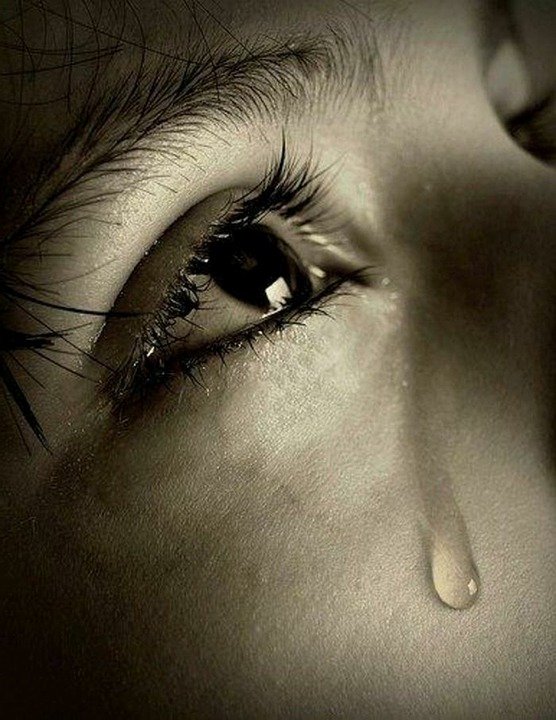[ESP/ENG] ¿Cómo vivir cuando no estés?
Hace pocos días sufrimos la partida física de otro familiar. Es triste ver episodios como estos y todo lo que se genera en torno a la muerte de un ser querido.

el dolor de la partida
Desafortunadamente todos pasamos por estos y, como seres humanos que somos a todos nos duele, quizás unos lo sientan menos o tal vez tengan más fortaleza interior para sostener el dolor, pero la partida física de una persona amada nos duele a todos.
Todavía tengo grabada la cara de dolor de mi cuñada por la partida física de su compañero de vida, con el que estuvo casado por 34 años. Pero, es la misma cara que tuvo mi esposa por la muerte de sus padres o las de mis hermanos y la mía por la misma causa. Muchas cosas nos invaden y los pensamientos negativos se apoderan de nosotros al pensar que la vida terminó o que nos será muy difícil seguir adelante.

tristeza
Ante esto siempre me he planteado estas interrogantes:
¿Estamos preparados para vivir sin la presencia física de la persona amada?
¿Cómo es posible soportar el dolor de no ver a quién nos dio la vida?
¿Qué resortes emplear para seguir la vida y tratar de existir lo mejor posible?
Lo primero que quiero aclarar es que es más fácil ser sicólogo de los demás que de uno mismo, De hecho, autoaplicarse esto es muy difícil. Quizás por eso cuando un familiar se enferma se evita que quien lo atienda sea el hijo que es médico porque el diagnóstico casi nunca tendrá toda la objetividad posible. Por eso, ante la necesidad de un sicólogo aplicamos la misma fórmula.
Dicho esto, les explico lo que siempre les he dicho a las personas que me han consultado y/o han pedido consejos en torno al tema y las preguntas realizadas.
Lo primero que les digo es que llorar es normal, natural y que lo hacemos por diversas causas y el dolor, la pérdida de algo querido lo provoca. No es delito llorar y que es falso ese criterio que dice que los hombres no lloran.
¿Estamos preparados para vivir sin la presencia física de la persona amada?
La respuesta es sí. La vida es un proceso natural y como dijo Charles Chaplin “Algo hay tan inevitable como la muerte y es la vida” En esta cita esboza la necesidad de vivir, pero deja latente que la muerte es la eterna compañera de la vida. Lo que sucede es que nuestra vida no será exactamente la misma y nos faltará ese otro ser con el que compartíamos tristezas y alegrías, proyectos de vidas, derrotas y victorias.
¿Cómo es posible soportar el dolor de no ver a quién nos dio la vida?
Si hay algo difícil es esto. En la pérdida de seres queridos perder a quién te dio la vida o a quien se la diste es terriblemente doloroso. Hay dolores que no nos dejan y estos son de esos. A veces uno ve a una persona que ha pasado por esto que sonríe o se divierte, pero el dolor está ahí latente, permanente, infinito. Usted no olvida, supera una fase de su vida, pero ese pedazo de su ser sigue y su dolor también.
¿Qué resortes emplear para seguir la vida y tratar de existir lo mejor posible?

resilencia
Esta es la clave, al menos para mí, para poder llevar una vida menos dolorosa y más placentera. Considero que:
•No debemos aferrarnos a las cosas materiales de esa persona. Esto nos hace daño. No es que todo lo botemos, rompamos o tiremos a la basura. Pero, acudir a esta práctica nos autodestruye. Es bueno quedarse con algo que nos recuerde algo bello, positivo o lo identifique, pero tener las cosas que nos hagan sentir mal no es recomendable.
•Aferrarnos a sus valores y sentimientos. Esto es importantísimo. La mejor manera de recordar a alguien es siendo consecuente con su manera de ser y de actuar. Rememorar con acciones sus valores, aptitudes y haciendo las cosas buenas que esa persona hacía es la manera que conozco de perpetuar su memoria y validar su obra.
•Celebrar sus fechas preferidas. Celebrar sus cumpleaños, los días dedicados a madres, padres, según sea el caso es otra manera que me ha dado resultado. Puede parecer una paradoja, pero vivir es una maravilla y celebrar esa maravilla que fue la vida de un ser querido es muy positivo.
•Hacer cosas que disfrutaba, le gustaba y le alegraba la vida. Quizás a muchos les haya pasado que en una comida que hacemos, una película que vemos, un libro que leemos o en la música escuchada recordemos a esa persona. Esto no es negativo siempre que no lo hagamos como regla, pero hacerlo de manera informal, casual e incluso porque queremos es una manera de tenerle siempre.
•Crear algún evento que perpetúe su memoria. Muchas veces se piensa que sólo a los que cultivaron el arte, las ciencias, los deportes u otra actividad social sólo merecen esta actividad. Varias pueden ser las maneras de crear algún evento que perpetúe la memoria de un ser amado que no está físicamente y que sirva para recordarle, honrarle, admirarle y seguirle recordando.
Lo anterior no es una receta mágica, créanme que no lo es, pero sí puedo decirles que me ha funcionado. Muchos tienen otras maneras de sobrellevar estas pérdidas y dolores. Si me ha leído me gustaría saber cuáles han sido y poder incorporarlas a mis consejos de vida.
Nota: Las fotos fueron tomadas de Pixabay.
ENGLISH
A few days ago we suffered the physical departure of another family member. It is sad to see episodes like these and everything that is generated around the physical departure of a loved one.

the pain of departure
Unfortunately we all go through these and, as human beings we all hurt, maybe some feel it less or perhaps have more inner strength to sustain the pain, but the physical departure of a loved one hurts us all.
I still have engraved on my sister-in-law's face the pain of the physical departure of her life partner, to whom she was married for 34 years. But, it is the same face my wife had for the death of her parents or those of my brothers and mine for the same cause. Many things invade us and negative thoughts take over us thinking that life is over or that it will be very difficult for us to move on.

sadness
Faced with this I have always asked myself these questions:
Are we prepared to live without the physical presence of the loved one?
How is it possible to bear the pain of not seeing the person who gave us life?
What levers can we use to go on with life and try to exist as best we can?
The first thing I want to make clear is that it is easier to be a psychologist for others than for oneself, in fact, to apply this to oneself is very difficult. Perhaps that is why, when a family member gets sick, one avoids having one's son, who is a doctor, take care of him/her because the diagnosis will almost never be as objective as possible. That is why, when we need a psychologist, we apply the same formula.

depression
Having said that, I will explain what I have always told people who have consulted me and/or asked for advice on the subject and the questions asked.
The first thing I tell them is that crying is normal, natural and that we do it for various reasons and pain, the loss of something dear causes it. It is not a crime to cry and that the criterion that says that men do not cry is false.
Are we prepared to live without the physical presence of the loved one?
The answer is yes. Life is a natural process and as Charles Chaplin said "There is something as inevitable as death and that is life" In this quote he outlines the need to live, but leaves latent that death is the eternal companion of life. What happens is that our life will not be exactly the same and we will miss that other being with whom we shared sorrows and joys, life projects, defeats and victories.
How is it possible to bear the pain of not seeing the one who gave us life?
If there is something difficult it is this. In the loss of loved ones, losing the one who gave you life or to whom you gave it is terribly painful. There are pains that do not leave us and these are one of those. Sometimes you see a person who has gone through this smiling or having fun, but the pain is there latent, permanent, infinite. You don't forget, you overcome a phase of your life, but that piece of your being remains and so does your pain.
What levers can you use to go on with your life and try to exist as well as possible?

resilience
This is the key, at least for me, to be able to lead a less painful and more pleasant life. I consider that:
We should not cling to the material things of that person. This hurts us. It is not that we throw everything away, break or throw it in the trash. But, to resort to this practice destroys us. It is good to keep something that reminds us of something beautiful, positive or identifies us, but keeping things that make us feel bad is not recommended.
Hold on to your values and feelings. This is very important. The best way to remember someone is to be consistent with their way of being and acting. Remembering with actions their values, aptitudes and doing the good things that person did is the way I know to perpetuate their memory and validate their work.
Celebrate their favorite dates. Celebrating their birthdays, the days dedicated to mothers, fathers, as the case may be, is another way that has worked for me. It may seem a paradox, but living is a wonder and celebrating that wonder that was the life of a loved one is very positive.
Doing things that he or she enjoyed, liked and made his or her life happy. Perhaps it has happened to many of you that in a meal we eat, a movie we watch, a book we read or music we listen to we remember that person. This is not negative as long as we do not do it as a rule, but doing it informally, casually and even because we want to is a way to always have him or her.
Create an event that perpetuates their memory. Many times it is thought that only those who cultivated art, science, sports or other social activity only deserve this activity. There can be several ways to create an event that perpetuates the memory of a loved one who is not physically present and that serves to remember, honor, admire and continue to remember him or her.
The above is not a magic recipe, believe me it is not, but I can tell you that it has worked for me. Many have other ways of coping with these losses and pains. If you have read me I would like to know what they have been and be able to incorporate them into my life advice.
Note: The photos were taken from Pixabay.
son perdidas que nos dejan un gran vació, vació que no se llena, pero si aprendemos a vivir con el.
Tiene toda la razón. Es difícil olvidar a alguien querido. Muchas de las cosas que nos suceden diariamente tienen relación con ella, pero es ley de vida y hay que seguir. Las personas tienen variados recursos para seguir, pero no quiere decir que olvidemos. Gracias por su comentario y por leer. Salud y saludos.
I feel sorry for what you've been through. I know that you can cope with what you are feeling right now. Just be strong and brave to face every challenges in life.
Thank you very much for the strength and encouragement your words convey. Thank you for your comment and for reading the publication. Greetings and best regards.
A mí me ayuda seguir recordándoles, trato de integrar su ausencia sin negar la tristeza. El tiempo colabora a continuar viviendo, lo que no significa que les olvidemos.
Me gustó mucho esta publicación, la siento realista y reconfortante a la vez. Gracias por traerla a la comunidad. 🤗
Muchas gracias por sus comentarios y por leer la publicación. Que venga de usted un criterio como este me reconforta mucho porque es una de las que más sigo y leo en el ecosistema. Muchas gracias de todo corazón. Salud y saludos.
Oh, muchas gracias por tus palabras. Por grande que sea este universo, los seres afines en sensibilidad terminamos encontrándonos y alimentando nuestros espíritus en lugares comunes. Es un honor para mí que me sigas. Un caluroso abrazo desde España. 🤗